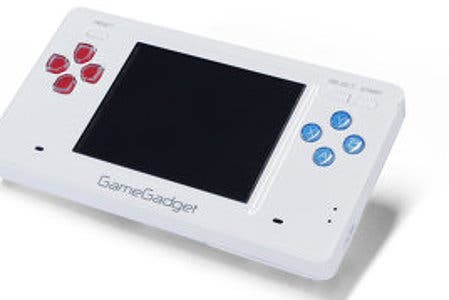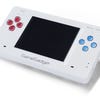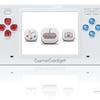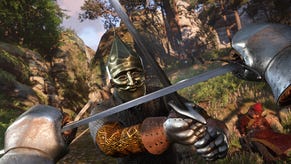Meet the £100 GameGadget handheld that has own retro download store
Eurogamer quizzes the maker.
Would you buy a GameGadget, a £100 handheld that resembles the bottom-half of a DS/3DS and downloads retro games from an online, platform-specific shop?
It's been developed in the UK (but built overseas), and will be available to buy on GameGadget.net from 30th March. (Deals with physical shops and other online outlets are on-going.)
The only problem is, we don't know which old tarts (affectionate slang for vintage games) will be available for the GameGadget, nor which publishers will support it.
Mark Garrett, general manager of GameGadget distributor Blaze Europe, told Eurogamer his lips were sewn together by NDA contracts. "We're in communication with all the major publishers," was all Garrett could say.
However, an announcement about publishers and games should be cleared "in the next week or so".
Game pricing will be at the publisher's discretion. But the emphasis is on cheap, thanks to an "open source" emulation platform that requires "no further development" for a game to run on GameGadget.
The hope is that publishers will see GameGadget as a hassle-free way of making some money from their back catalogues, rather than watch those games be shamelessly emulated online.
"It's a very low-cost, low investment vehicle for getting games onto a digital platform," Garrett assured us.
"Because there's no investment in bringing the games to the platform, we want the games to be as competitively priced as possible. As an estimate, we would want the games to start at £0 - there is an opportunity to offer free gaming - up to around the £1.49/£1.99 price-point for a single game," Garrett revealed.
"And then a bundle of games - maybe 10 or 15 games - for around the £10 price point. Those are the sort of recommendations we're making to publishers."
Excluding a touch-screen in favour of "hard-buttons" means playing on GameGadget should feel like the real-retro-deal, Garrett explained to us.
But for £100? I could buy a 3DS for little more, and my iPhone/Android device cost me nothing up front.
"Ultimately what we're looking to do is enable people to save money over the long-term by offering a more cost effective solution for obtaining more and more content."
Mark Garrett, general manager, Blaze Europe
Isn't the GameGadget a bit expensive?
"That's a matter of opinion, isn't it?" Garrett retorted. "It's all relative.
"I mean, iPhones are certainly not free! The bill that I get from Vodaphone every month is about £60 a month for my free iPhone.
"And although 3DSs cost £115, on average you're paying around £30 per game to get the most out of it."
Garrett romped on: "Whereas the traditional model is that the hardware is loss-leading for these manufacturers, ultimately you end up paying for it through the software that you buy. What we want to do is provide a device that offers value for money, that's a good quality gaming device, and that has a digital download platform that offers value for money for games.
"Ultimately what we're looking to do is enable people to save money over the long-term by offering a more cost effective solution for obtaining more and more content."
The GameGadget specs are: 433mhz dual core CPU, 64MB RAM / 2GB Flash RAM and a 3.5" LCD screen (320x240) that does the appropriate 16BIT colour. It has a Li-Ion rechargeable battery. Sounds like lion - maybe it should be roarchargeable.
There's a d-pad, two shoulder buttons, four face buttons and start/select/reset buttons.
There are stereo speaker, headphone and TV-out outputs. There's also a Micro-USB port, and the option of SD/SDHC additional storage.
The GameGadget's dimensions are 140Wx75Hx16D (mm).














